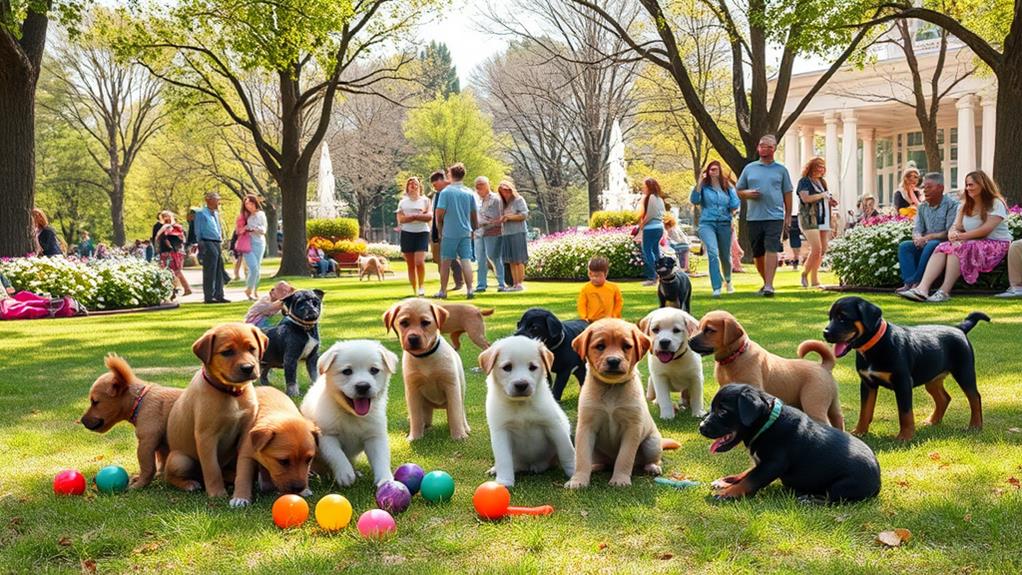To socialize your hyperactive puppy, start by exposing them to diverse environments and sounds. Short trips to the park can help, along with rewarding calm behavior with treats and praise. Schedule controlled playdates with well-mannered dogs, ensuring supervision and setting clear rules to avoid overstimulation. Use positive reinforcement consistently to create a strong connection between good behavior and rewards. Incorporate engaging activities like obstacle courses or fetch with commands to burn off energy while instilling discipline. By implementing these techniques, you'll foster a well-adjusted pup ready to thrive in various social situations. There's so much more to discover about effective training!
Understanding Hyperactive Behavior
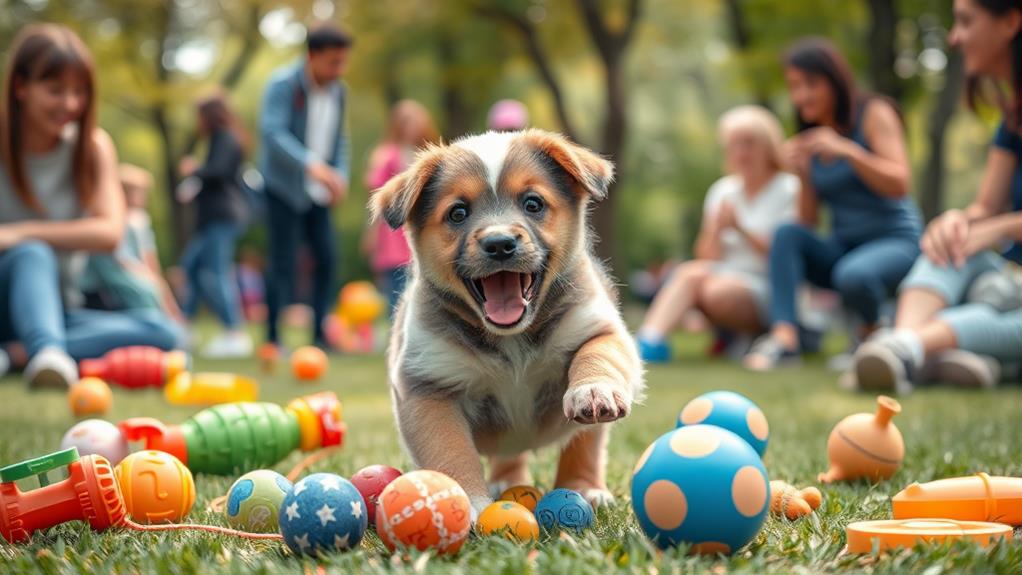
How can you tell if your puppy's energy level is simply playful or truly hyperactive? It's imperative to observe their behavior closely. Playful puppies often engage in fun activities, like chasing toys or frolicking with other dogs, and they tend to take breaks to rest or cuddle with you.
On the other hand, hyperactive puppies seem to have an endless supply of energy. They might dart around, jump excessively, or even nip at you out of excitement, showing little to no signs of winding down.
Look for patterns in their behavior. If your pup can't settle down after exercise or continues to act out despite your attempts to redirect them, hyperactivity may be the root cause. Additionally, consider their age; younger puppies naturally have more energy, but if your dog is older and still exhibits these behaviors, it might indicate hyperactivity.
Early Socialization Strategies
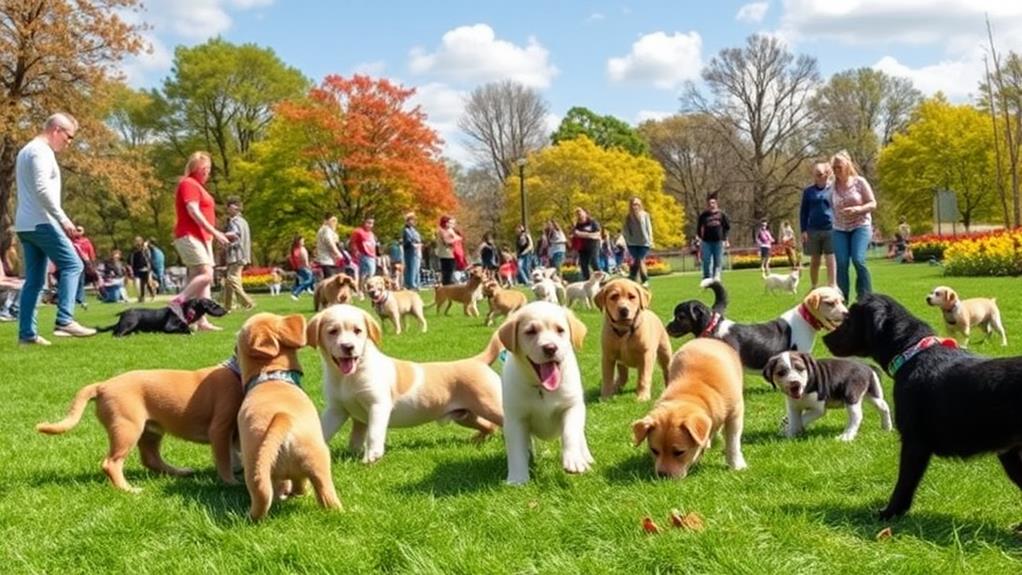
Socialization is key for hyperactive puppies, as it helps them learn appropriate behaviors and manage their energy levels. Start early by exposing your puppy to different environments, sounds, and people. Take short trips to the park, where they can experience new sights and smells. Guarantee these outings are positive; bring treats and praise to reinforce good behavior.
Introduce your puppy to various surfaces, such as grass, gravel, and concrete, to build their confidence. You can also play calming music or use gentle noises to familiarize them with sounds like thunder or sirens. Remember, the goal is to reduce fear and anxiety in new situations.
Invite friends and family over to interact with your puppy, encouraging gentle handling and positive reinforcement. This will help them learn to trust and feel comfortable around different individuals. Keep interactions brief but frequent to avoid overwhelming them.
Controlled Playdates
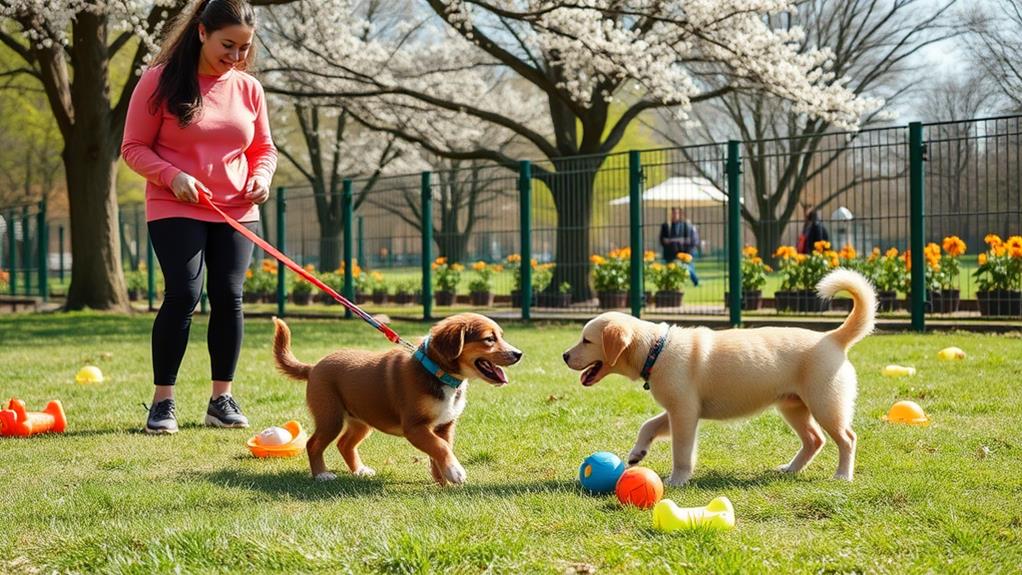
Organizing controlled playdates is an effective way to help your hyperactive puppy learn appropriate social skills while managing their energy. These playdates allow your pup to interact with other dogs in a safe environment, ensuring they're learning how to behave around their peers.
- Choose the Right Friends: Invite well-mannered and calm dogs that can handle your puppy's energy levels. This helps promote positive interactions.
- Set Clear Boundaries: Establish rules for the playdate, such as no rough play or excessive barking, to keep everything under control.
- Supervise Closely: Always keep an eye on the dogs. Watch for signs of stress or aggression, and be ready to intervene if necessary.
- Limit the Duration: Keep playdates short, around 30 minutes, to prevent overstimulation. Gradually increase the time as your puppy becomes more comfortable.
Positive Reinforcement Techniques
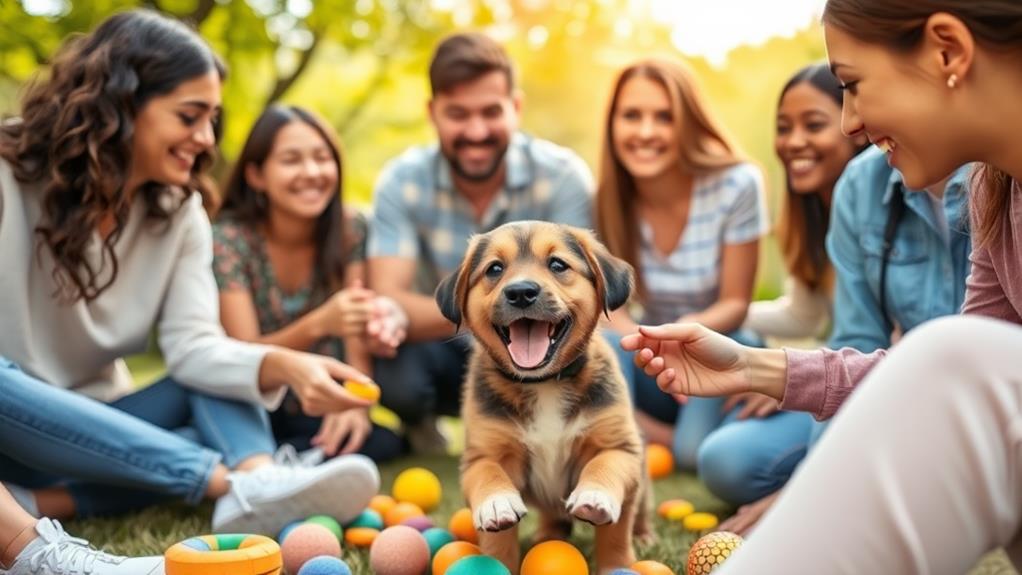
Using positive reinforcement techniques can markedly enhance your hyperactive puppy's training and socialization. By rewarding desired behaviors with treats, praise, or playtime, you create a positive association that encourages your puppy to repeat those behaviors. For instance, when your puppy sits calmly during a socialization session, immediately reward them. This approach helps them understand what you expect and reinforces their good behavior.
It's essential to be consistent with your rewards. If your puppy responds well to a certain treat, use it consistently during training. Timing is also key; reward your puppy right after they display the desired behavior to strengthen the connection in their mind.
Don't forget to vary the rewards to keep your puppy engaged. Occasionally surprise them with a favorite toy or extra playtime for following commands. This unpredictability keeps their interest piqued and makes training more enjoyable for both of you.
Avoid harsh corrections or negative reinforcement, as these can lead to fear or anxiety, which is counterproductive, especially for a hyperactive puppy. Focus on building trust and a strong bond through positive experiences, leading to a well-adjusted, socialized companion.
Engaging Training Exercises
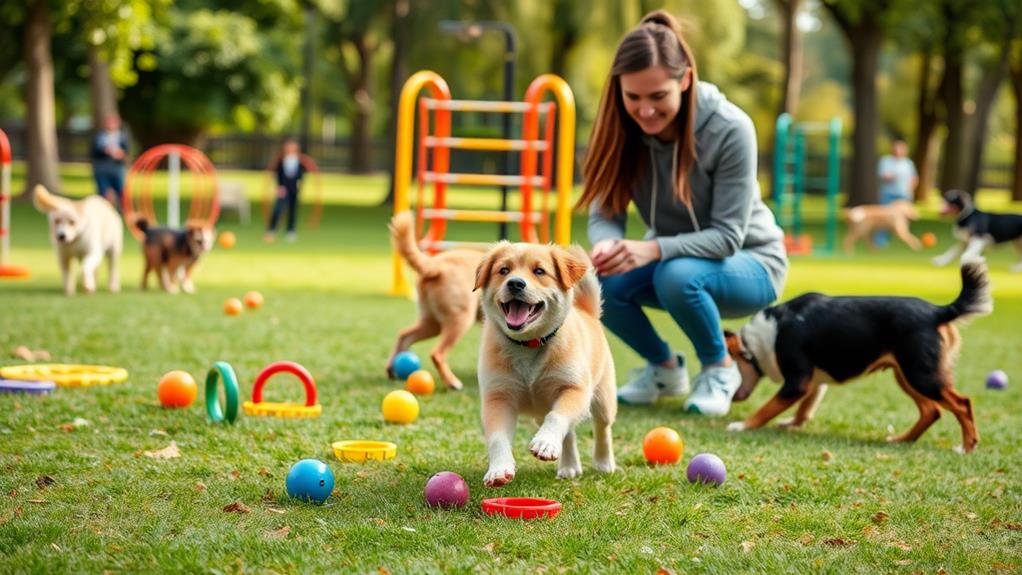
Engage your hyperactive puppy with fun and dynamic training exercises that not only promote learning but also channel their energy. These exercises will strengthen your bond and help your puppy focus.
Here are four effective training exercises to try:
- Hide and Seek: Teach your puppy to stay while you hide. Then call them to find you. This game sharpens their listening skills and provides mental stimulation.
- Obstacle Course: Set up a simple course using household items like chairs and cushions. Encourage your puppy to navigate through the obstacles, enhancing their agility and confidence.
- Fetch with a Twist: Play fetch, but add commands like "sit" or "down" before throwing the toy. This not only tires them out but reinforces basic commands.
- Tug-of-War: Use a sturdy toy for a game of tug. It's a great way to burn off energy and can be a fun way to teach "drop it" or "leave it."
Incorporating these exercises into your routine keeps your hyperactive puppy engaged and helps them learn discipline through play. Remember, consistency is key, so make training a regular part of your day!
Frequently Asked Questions
What Age Is Ideal for Starting Socialization With My Puppy?
The ideal age for starting socialization with your puppy is around 3 to 14 weeks. During this critical period, exposing them to various experiences helps shape their behavior and confidence in new situations.
How Can I Tell if My Puppy Is Overstimulated?
You notice your puppy's tail's wagging furiously, but something feels off. Look for signs like excessive panting, biting at air, or inability to focus—these indicate your puppy's overstimulated and needs a break.
Are There Specific Breeds That Are More Hyperactive?
Certain breeds, like Border Collies and Jack Russell Terriers, tend to be more hyperactive. You'll notice they require more exercise and mental stimulation to keep them happy and healthy, so be prepared for their energy!
Can Diet Affect My Puppy's Hyperactive Behavior?
Imagine a whirlwind of energy bouncing around your living room. Yes, diet can absolutely affect your puppy's hyperactivity. Providing balanced nutrition helps regulate energy levels, ensuring your furry friend isn't a constant tornado of chaos.
Should I Consult a Veterinarian for Hyperactivity Issues?
Yes, you should consult a veterinarian for hyperactivity issues. They can assess your puppy's health, rule out any underlying conditions, and provide tailored advice or treatment options to help manage your puppy's energy levels effectively.
Conclusion
Incorporating these socialization techniques can transform your hyperactive puppy into a well-adjusted companion. For instance, consider Max, a rambunctious Labrador who struggled with distractions. By implementing structured playdates and positive reinforcement, his owner saw a remarkable change; Max became calmer and more sociable. Remember, your efforts today can lead to a happier, more balanced dog tomorrow. So, get started on these strategies and watch your pup thrive in their social environment!

